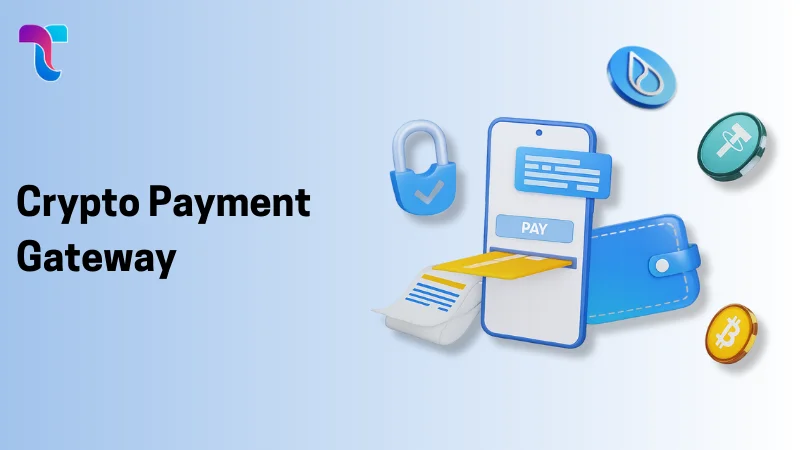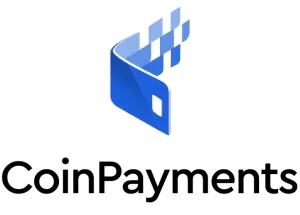Table of Contents
Let’s start this blog with an imagination!
You are walking into a coffee shop, ordering your favourite coffee, and paying for it, not with cash or a credit card, but with Bitcoin. Isn’t it sounding futuristic? Not anymore! Well, that’s what crypto payment gateways are all about!
Over 15,000 businesses worldwide now accept cryptocurrency as a form of payment. And this number keeps growing as digital assets become more mainstream.
So, are you looking to understand how crypto payment gateways work? But doesn’t it sound a bit complicated at first? Don’t worry, we’ve got you!
In this beginner-friendly guide, we’ll talk about everything you need to know about a crypto payment gateway.
Let’s get started with the blog!
What is a crypto payment gateway?
In simpler terms, a crypto payment gateway is a digital platform that allows businesses to accept cryptocurrencies like Bitcoin and Ethereum as a form of payment. Just like traditional gateways such as PayPal or Stripe, which process credit card and bank transactions, cryptocurrency payment gateways facilitate secure and efficient payment processing. Using blockchain technology allows it to provide great security and transparency for both business owners and customers.
Traditional payment gateways have long been trusted for handling fiat currency transactions, but can involve higher costs and slower processing times. Crypto payment gateways can help bridge the long gap that is between digital currencies and traditional finance and allow businesses to accept cryptocurrency payments.
How Does a Crypto Payment Gateway Work?
Crypto payment gateways help facilitate online payments between customers and businesses. Here’s how they basically work, step by step:
- Transaction Initiation: The customer in the online shop chooses to pay with cryptocurrency. He gets a list of all the supported coins and chooses one to continue with the payment.
- Fiat Currency Conversion: If the store owner wants traditional money instead of cryptocurrencies, the gateway automatically changes the digital currency into fiat based on the current way.
- Generating a Payment Address: Once the customer confirms the payment method, the crypto payment processor prepares a unique wallet address or a QR code. Using it, the customer can send the payment directly.
- Verification & Confirmation Processes: Next, the customer types the amount, and the crypto wallet pushes the transaction to the cryptocurrency’s public network for checking.
- Verification on Blockchain: When the network receives that payment request, the nodes check it, and when it is agreed, the transaction is executed.
- Merchant Notification: The gateway then sends a notification of the payment to the seller, which can help them begin the next step, like preparing the products or services.
- Settlement & Payout: Now, the transaction is done, and the coins go directly to their wallet. Or, if they want regular money, the gateway can turn them into cash.
Benefits of Using a Crypto Payment Gateway
Now, let’s talk about some of the benefits that come with using a crypto payment gateway for businesses and customers!
Lower Transaction Fees
One of the advantages of a crypto payment gateway is the reduced cost per transaction. Traditional payment processors like credit card companies often charge 2-5% fees. On the other hand, the crypto transactions incur minimal fees.
For businesses operating on thin margins or dealing with high transaction volumes, these savings can be a benefit. Lower fees can also mean better pricing flexibility, which allows business owners to provide competitive rates to customers without losing profits.
Faster Settlements
Crypto payments are processed much faster than traditional banking methods. While wire transfers or credit card settlements can take 2–5 business days to clear, most crypto transactions are settled within minutes. This improves cash flow for businesses and provides customers with quick confirmation of their payments.
Faster settlements also reduce the risks associated with payment delays. This makes operations smoother, particularly for e-commerce and global service providers.
Global Reach
Cryptocurrencies are decentralized and not tied to any specific country or banking system. A crypto payment gateway allows for global crypto payments from customers anywhere in the world without worrying about exchange rates, banking restrictions, or high international transaction fees.
This makes it easier to serve a global pool of customers and step into new markets. For customers, it provides a convenient and borderless payment method that’s both fast and accessible.
Enhanced Security
Crypto payments are backed by blockchain technology, which is known for its strong security features. Every transaction is encrypted and recorded on a public ledger, and it cannot be altered once confirmed. This further reduces the risk of fraud.
Additionally, customers don’t need to share sensitive financial details like credit card numbers during checkout, which reduces the risk of data breaches. For businesses and consumers, this added protection layer helps execute secure cryptocurrency transactions.
Modern Brand Image
Accepting Bitcoin payments online makes your business as forward-thinking, and providing crypto payments shows that your business is adapting to evolving trends. This can set your business apart from competitors and attract new customers.
It also enhances your reputation as a company that values technology and convenience in global commerce, which makes your business more appealing in today’s digital-first economy.
Best Crypto Payment Gateways in 2025
Here are the top 5 crypto payment gateways that you can consider to accept cryptocurrencies or look to optimize your payment systems:
NOWPayments
NOWPayments is a highly flexible and non-custodial gateway that is known for supporting over 300 cryptocurrencies. It offers auto-conversion, fiat on/off-ramps, and transparent, low fees, with fast integration via API, plugins, or widgets. It is perfect for businesses wanting full control of funds while accepting a wide range of crypto assets across global markets.
| PROS | CONS |
| Supports 300+ cryptocurrencies | No mobile app |
| Low transaction fees (0.5–1%) | Limited PoS support |
| Non-custodial (you control your funds) | Not ideal for large enterprises |
Coinbase Commerce
Backed by the trusted Coinbase crypto exchange platform, Coinbase Commerce allows businesses to accept crypto payments directly into self-custody wallets. With easy integration into platforms like Shopify and WooCommerce, it is a beginner-friendly solution with strong brand security, which is perfect for merchants looking for a simple and reliable way to offer crypto payments.
| PROS | CONS |
| Backed by Coinbase (trusted brand) | 1% transaction fee |
| Easy integration (Shopify, WooCommerce) | Limited coin support |
| Secure and user-friendly | Less customizable than competitors |
CoinGate
CoinGate supports over 70 cryptocurrencies and provides seamless integration for e-commerce platforms and point-of-sale systems. Especially strong in the European market, it enables merchants to accept crypto and receive settlements in fiat. It is a well-rounded solution for global crypto payment acceptance with good security features.
| PROS | CONS |
| Accepts 70+ cryptocurrencies | Higher transaction fees |
| Offers SEPA payouts in fiat | Customer support can be slow |
| Strong EU and global presence | Fewer integrations compared to others |
BitPay
BitPay is a long-established crypto payment gateway that offers reliable tools for merchants, including fiat settlements, billing, and prepaid crypto cards. It supports major cryptocurrencies like Bitcoin and Ethereum. It is a great option for businesses looking for crypto payment gateway integration while keeping traditional finance tools in place.
| PROS | CONS |
| Well-established & enterprise-grade | Limited coin support |
| Offers fiat conversion | 1% + fixed fee per transaction |
| Includes crypto debit card & billing tools | Reports of slow customer support |
CoinPayments
CoinPayments is one that supports over 1,200 cryptocurrencies and provides tools like recurring billing, shopping cart plugins, and multi-signature wallets. It is perfect for both small business owners and larger businesses looking for wide coin support and security. Its global accessibility and low fees make it a powerful solution for crypto payment processing.
| PROS | CONS |
| Accepts 1,200+ cryptocurrencies | Complex user interface |
| Offers shopping cart plugins & billing tools | Less intuitive for beginners |
| Competitive fees (0.5–1%) | Steeper learning curve |
Wrapping Up
That’s a wrap for this blog!
Accepting crypto payments is now quickly becoming a smart move for businesses that want to stay ahead of the curve. And the right crypto payment gateway can make transactions faster, cheaper, and more secure for you and your customers.
But let’s be honest, setting up or integrating crypto payments can feel a bit complicated if you are new to the space. That’s where Technoloader comes in. We help businesses like yours integrate crypto payment systems that are smooth, secure, and built to scale.
Want to start accepting crypto like a pro? Let us help you make it happen!
FAQs
Can I use a crypto payment gateway to accept Bitcoin and other coins?
Yes, ofcourse! Most of the crypto payment gateways support Bitcoin along with other popular cryptocurrencies such as Ethereum, Litecoin, and even stablecoins.
Is a crypto payment gateway safe to use?
Without a doubt, yes! Crypto payment gateways are generally safe when using reputable providers. They use blockchain technology for secure transactions and even provide features like multi-signature wallets, encryption, and two-factor authentication.
Which is the best crypto payment gateway in 2025?
The best gateway ultimately depends on your business needs and goals. NOWPayments is great for flexibility and coin support, whereas Coinbase Commerce provides ease of use, and BitPay is ideal for enterprise-level needs. To choose one out of the list, you must consider factors like fees, supported coins, and integration options.
Do crypto payment gateways convert crypto to cash automatically?
Some gateways offer automatic conversion to fiat currencies, while others send crypto directly to your wallet. For example, BitPay allows automatic fiat settlement, while Coinbase Commerce is fully non-custodial and does not convert crypto unless you manually transfer it to an exchange.
What are the fees charged by crypto payment gateways?
The fees charged by crypto payment gateways vary by provider but typically range from 0.5% to 1% per transaction. Some platforms may also include fixed charges or additional fees for fiat settlement or currency conversion.
Can small businesses use crypto payment gateways?
Absolutely! Many crypto gateways are designed with small businesses in mind and even offer simple setup, low fees, and easy integration with platforms like Shopify or WooCommerce.
Can I accept stablecoins like USDT or USDC with crypto payment gateways?
Yes, ofcourse! Most modern crypto payment gateways support popular stablecoins like USDT and USDC.
Do crypto payment gateways work globally?
Yes, one of the biggest advantages of crypto payment gateways is their global reach. Since cryptocurrencies are borderless, you can accept payments from customers anywhere in the world.
 +91 7014607737
+91 7014607737
 info@technoloader.com
info@technoloader.com








